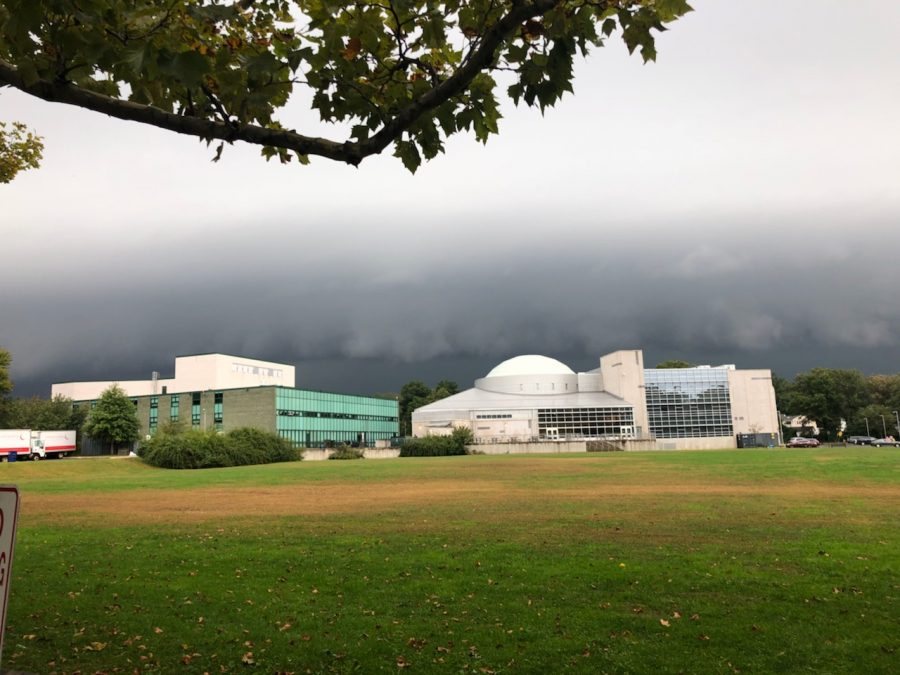By Eliza Barr ’21
Dark skies, increasingly strong wind, heavy rain and occasional glimpses of lightning. When weather turns dangerous, phones around Fairfield County simultaneously chime warnings, advising people to take cover. But not the Staples cross country team. They are just about to begin their race.
It’s not the first time teams have been sent out in bad weather this year. Already this season, there have been countless cancellations and rescheduling of games. But for all of the cancellations, just as many practices, games and meets continue during days of particularly rough weather.
Staples teams this year have faced practices in everything: extreme heat and downpours all the way to massive storms like the near tornado last Tuesday. At what point do practices need to be called off? Is it really worth risking athletes safety just for a few more hours of practice?
In my experience being involved in Staples’ running programs through all different seasons, I can contend that I have been through far too many times where I found myself in a weather condition I didn’t feel comfortable with. Most recently, heat halted many students’ ability to run seeing that there wasn’t any practice cancellations.
But in the past weather conditions like ice on roads or pouring rain haven’t stood in the way of practices continuing on the daily. The level at which certain teams deal with weather varies between sports, but I think there should be a set standard across sports that does a better job of making sure athletes aren’t being put in bad conditions.
This year’s fall season kicked off with temperatures off the charts. It was unlike any heat seen in Westport during early September. For example, during the last few days of August, typically when preseason is in full swing, Westport faced record high temperatures. On Aug. 28, at 2:30 p.m.––right when athletes are commonly out practicing––the heat peaked at 95 degrees, though it felt like 108. The air quality was marked at “poor.” For reference, the American College of Sports Medicine advises canceling outdoor competitions or meets when the heat index reaches 82, and all outdoor athletic activities at a heat index over 90.
The heat made practices nearly unbearable for some on the girls’ cross country team. People struggled running with running at all, let alone distances, and the intense heat was too much for some, causing people to pass out. During these days, there were three girls on the team who experienced fainting, as well as multiple counts of vomiting. Yet, practice continued.
A big part of the problem where practicing in heat can become a problem is when athletes aren’t well enough informed on how much water someone should be drinking. According to the Center of Disease Control, there are dozens of illnesses that come from working out in hot weather without proper water breaks, and the effects it can have on your body such as severe dehydration, heat stroke, and heat rash.
Personally, I am perplexed by the thought that any Staples athlete should at all be allowed to exercise in the heat at all. At a certain point, it starts putting pressure on athletes, forcing them to choose between maintaining their health or going out practice on a day with extreme weather.
I’ve always had parents who take weather extremely seriously on the days with serious heat and poor air quality. They pulled me out from a recent meet during a thunderstorm and from practices with heavy rainfalls. I’ve never experienced my teammates saying I couldn’t do that, but I always felt oddly guilty that I was leaving, even though I knew it was smarter to be putting my safety before my sport.
But heat isn’t the only bad weather Westport has faced this fall. In just the past few weeks, Westport has seen a record amount of rainfall, creating multiple occasions of flooding and wet roads and fields. A majority of the time, practices and meets were cancelled when fields and turfs became too slippery, but lots of teams still held practices. The cross country team experienced trouble running on wet roads, saying that at times they were running through water up to their shins.
When running in the rain the other week, Anna Seiple ’21 and her group had to deal with cars pulling over and telling them to stop running due to their inability to see them, as well as multiple instances of being drenched by cars splashing by.
Not only do I think that Staples teams need to be even better advised about drinking water, but I also think that kids should be reminded that it isn’t the end of the world to miss a day of practice. Athletes and coaches need to be more realistic when judging if exercising outside is truly safe. There is almost always an alternative to practicing outside such as putting in time at the weightroom. Either way, kids shouldn’t be put in situations where they have to put their athletic activities above their safety and at any sign of extreme heat, poor air quality, excessive rain, thunder or lightening, practices should be canceled.














































